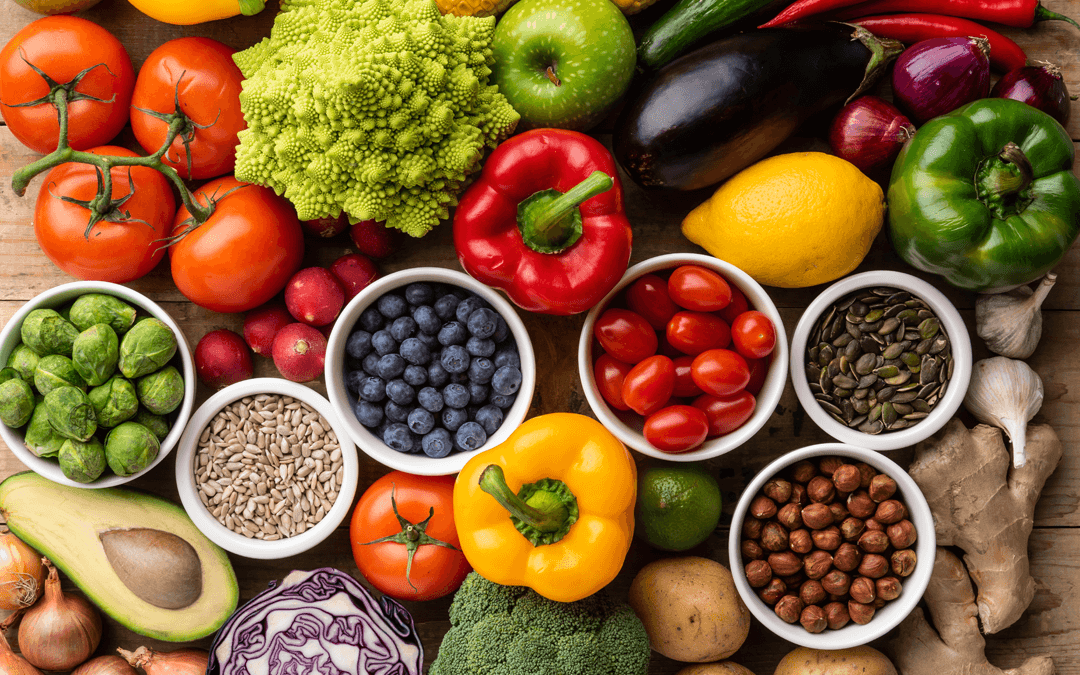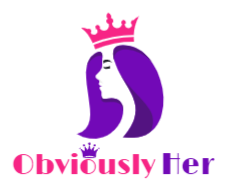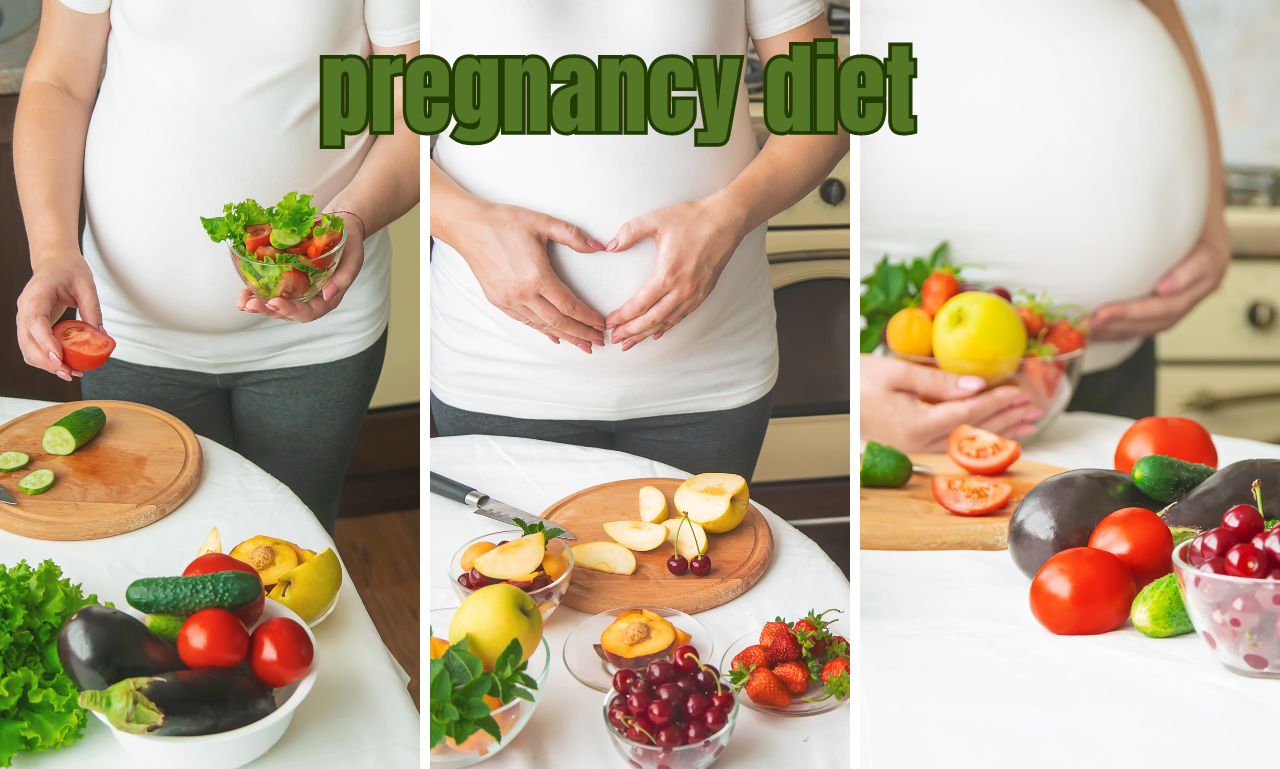A pregnancy diet should focus on whole grains, proteins, and low-fat dairy products to ensure a healthy and balanced nutrition plan. Including fresh fruits and vegetables, whole grain breads and cereals, and maintaining a regular eating routine can help manage weight during pregnancy.
Consuming a variety of vegetables, healthy proteins, grains, fruits, and dairy products can provide essential nutrients for the development of the baby. It is important to avoid foods high in saturated fat and sugar and to stay hydrated by drinking plenty of water.
Following these guidelines can help pregnant women maintain a healthy diet throughout their pregnancy journey.
To see/buy Pregnancy Diet visit Amazon here.
Importance Of Pregnancy Diet
A healthy pregnancy diet is crucial for the well-being of both the mother and the baby. The food choices made during pregnancy directly impact the baby’s development and ensure a healthy pregnancy. Nourishing your baby with healthy choices, reaping the benefits of a good pregnancy diet, and understanding how diet affects the baby’s development are essential aspects of maintaining a healthy pregnancy. Let’s delve into these topics further:
Nourishing Your Baby With Healthy Choices
During pregnancy, it is vital to nourish your baby with a variety of healthy choices. Incorporating a balanced mix of foods from different food groups ensures that your baby receives all the essential nutrients for growth and development. Here are some key diet tips to follow:
- Include whole grains like brown rice, millet, oatmeal, bulgur, and whole-wheat bread to boost fiber intake and provide important carbohydrates for energy.
- Consume proteins from lean meats and chicken, eggs, seafood, beans and lentils, nuts and seeds, and tofu to support the baby’s tissue and organ development.
- Opt for low-fat or fat-free dairy products like milk, yogurt, cheese, lactose-free dairy, and fortified soy beverages to meet the calcium and vitamin D needs.
- Eat a variety of fresh fruits and vegetables, which are packed with essential vitamins, minerals, and fiber.
- Incorporate healthy fats and oils from sources like avocados, nuts, and olive oil to support brain development.
- Stay hydrated by drinking plenty of water and consuming healthy beverages.
Benefits Of A Good Pregnancy Diet
A good pregnancy diet offers numerous benefits to both the mother and the baby. Here are some key advantages of maintaining a healthy diet during pregnancy:
- Provides essential nutrients for the baby’s growth and development.
- Promotes a healthy weight gain during pregnancy, reducing the risk of complications.
- Boosts the immune system, ensuring the overall well-being of both the mother and the baby.
- Prevents nutrient deficiencies, which can lead to birth defects or developmental delays.
- Reduces the likelihood of gestational diabetes and high blood pressure.
- Supports the mother’s energy levels and aids in postpartum recovery.
To see/buy Pregnancy Diet visit Amazon here.
How Diet Affects Baby’s Development
The diet during pregnancy plays a crucial role in the baby’s development. The nutrients obtained from the mother’s diet are used to form the baby’s organs, tissues, and bones. Here are some ways in which diet affects the baby’s development:
| Nutrient | Function | Food Sources |
|---|---|---|
| Folate and Folic Acid | Helps in the formation of the baby’s neural tube and prevents neural tube defects. | Leafy greens, citrus fruits, fortified cereals, and legumes. |
| Iron | Aids in the production of hemoglobin, which carries oxygen to the baby. | Red meat, poultry, fish, beans, and fortified grains. |
| Calcium | Builds strong bones and teeth for the baby. | Dairy products, fortified plant-based milk, almonds, and leafy greens. |
| Omega-3 Fatty Acids | Promotes brain and eye development. | Fatty fish, chia seeds, walnuts, and flaxseeds. |
| Protein | Supports the growth of the baby’s organs and tissues. | Lean meats, poultry, fish, eggs, legumes, and tofu. |
Ensuring a well-rounded and nutritious diet during pregnancy is essential for the baby’s healthy development and sets the foundation for their future well-being.

Credit: cells4life.com
Key Nutrients For A Healthy Pregnancy
Maintaining a healthy pregnancy diet is crucial for the well-being of both mother and baby. Key nutrients such as whole grains, lean protein, fruits, vegetables, and healthy fats should be incorporated into the daily meals to support a healthy and successful pregnancy journey.
To see/buy Pregnancy Diet visit Amazon here.
Folate And Folic Acid
One of the key nutrients for a healthy pregnancy is folate, also known as folic acid. Folate is essential for the proper development of the baby’s neural tube, which eventually becomes the brain and spinal cord. It also helps in the production of red blood cells and supports the growth and division of cells.
During pregnancy, it is recommended to consume around 600-800 micrograms (mcg) of folate daily. Good sources of folate include leafy green vegetables such as spinach and kale, citrus fruits, beans, lentils, and fortified cereals. It’s important to note that some women may require a higher dosage of folic acid, and it is best to consult with a healthcare provider to determine the appropriate supplement dosage.
To see/buy Pregnancy Diet visit Amazon here.
Iron
Iron is another essential nutrient for a healthy pregnancy as it helps in the production of hemoglobin, which carries oxygen to the baby and prevents anemia in both the mother and the baby. Pregnant women require approximately 27 milligrams (mg) of iron daily.
To ensure an adequate intake of iron, include iron-rich foods such as lean meats, poultry, fish, eggs, legumes, and fortified cereals in your diet. It’s important to consume iron-rich foods alongside foods high in vitamin C, as it enhances iron absorption. However, it may be necessary to take iron supplements as prescribed by a healthcare provider if iron levels are still low.
Protein
Protein plays a crucial role in the development of the baby’s organs, muscles, and tissues. It is recommended that pregnant women consume an additional 25 grams of protein daily.
Including lean meats, poultry, fish, eggs, dairy products, legumes, nuts, and seeds in your diet can help meet your protein needs. Aim to have a protein source at every meal and snack to ensure a balanced intake throughout the day.
Omega-3 Fatty Acids
Omega-3 fatty acids, particularly DHA (docosahexaenoic acid), are essential for the baby’s brain and eye development. It also helps in preventing preterm labor and postpartum depression in mothers.
Good sources of omega-3 fatty acids include fatty fish such as salmon, trout, and sardines. Pregnant women can also include flaxseeds, chia seeds, and walnuts in their diet. If it is challenging to meet omega-3 requirements through food alone, a healthcare provider may recommend DHA supplements.
Calcium
Calcium is essential for the development of the baby’s bones, teeth, and muscles. Pregnant women require approximately 1,000-1,300 milligrams (mg) of calcium daily.
Include dairy products such as milk, yogurt, and cheese in your diet to ensure an adequate calcium intake. In case of lactose intolerance or if you follow a plant-based diet, consider fortified plant-based milk alternatives, tofu, leafy green vegetables, and calcium-fortified foods. If it’s difficult to meet calcium needs through diet alone, consult with a healthcare provider about calcium supplements.
Vitamin D
Vitamin D is necessary for the absorption of calcium and promotes proper bone development in the baby.
To meet the recommended intake of vitamin D, spend some time in sunlight, as the sun helps the body produce vitamin D. Additionally, include foods like fatty fish, eggs, and fortified dairy products in your diet. If necessary, a healthcare provider may recommend vitamin D supplements to ensure adequate levels.
Ensuring a well-balanced diet that includes these key nutrients can help support a healthy pregnancy and contribute to the optimal development of the baby. Remember to consult with a healthcare provider to determine the specific nutrient requirements for your individual pregnancy journey.
Creating A Balanced Pregnancy Diet
Pregnancy is a beautiful, transformative journey for a woman. It is a time of excitement and anticipation, but it also comes with the responsibility of taking care of your health and the health of your growing baby. A balanced pregnancy diet plays a crucial role in ensuring a healthy pregnancy and promoting optimal fetal development. In this blog post, we will explore the key aspects of creating a balanced pregnancy diet, including meal planning, choosing the right foods for each trimester, maintaining proper hydration, healthy weight gain, and managing cravings and food aversions.
Meal Planning And Preparing Healthy Snacks
Meal planning is an essential component of a balanced pregnancy diet. By planning your meals in advance, you can ensure that you are consuming a variety of nutrient-dense foods that meet your daily nutritional needs. This can include fruits, vegetables, whole grains, lean proteins, and healthy fats.
Preparing healthy snacks is equally important. Having nutritious snacks readily available can help you avoid reaching for unhealthy options when hunger strikes. Opt for fresh fruits and vegetables, whole-grain crackers, yogurt, or nuts as healthy snack choices. These options provide essential nutrients, such as vitamins, minerals, and fiber, that support your baby’s growth and development.
To see/buy Pregnancy Diet visit Amazon here.
Choosing The Right Foods For Each Trimester
As your pregnancy progresses, your nutritional needs may change. It’s important to choose the right foods for each trimester to support your body and your baby’s development. During the first trimester, focus on consuming folate-rich foods, such as leafy greens, citrus fruits, and legumes, to support early fetal development. In the second and third trimesters, aim for foods that are rich in iron, calcium, and omega-3 fatty acids, which are essential for your baby’s bone and brain development.
Maintaining Proper Hydration
Staying hydrated is crucial during pregnancy. Water plays a vital role in various bodily functions, including supporting your baby’s growth, regulating body temperature, and aiding digestion. Aim to drink at least 8-10 cups of water per day. If you find plain water boring, you can infuse it with natural flavors like lemon or cucumber for added taste.
Healthy Weight Gain During Pregnancy
Gaining weight is a normal part of pregnancy, but it’s important to maintain a healthy weight gain to support your baby’s growth and minimize the risk of pregnancy complications. Your healthcare provider can guide you on the appropriate weight gain based on your pre-pregnancy BMI. Focus on eating nutrient-dense foods, such as lean proteins, whole grains, and healthy fats, and avoid empty calories from sugary drinks and processed foods.
To see/buy Pregnancy Diet visit Amazon here.
Dealing With Cravings And Food Aversions
Pregnancy can bring about intense cravings and food aversions, making it challenging to stick to a balanced diet. It’s essential to listen to your body and find ways to address these cravings and aversions while still maintaining a balanced pregnancy diet. Substitute unhealthy cravings with healthier alternatives, such as swapping ice cream for a frozen yogurt topped with fresh berries. If certain foods trigger aversions, try different cooking methods or incorporate them into recipes where their taste is less prominent.
:max_bytes(150000):strip_icc()/article_291139_the-top-10-healthiest-foods-for-kids_-02-4b745e57928c4786a61b47d8ba920058.jpg)
Credit: www.eatingwell.com

Credit: www.parents.com
Frequently Asked Questions For Pregnancy Diet
What Is The Best Diet To Be On While Pregnant?
During pregnancy, it is best to follow a diet that includes whole grains, lean meats, eggs, seafood, beans, nuts, seeds, tofu, low-fat dairy, and plenty of fruits and vegetables. Avoid sugary and fatty foods. Be sure to get enough protein and stay hydrated.
To see/buy Pregnancy Diet visit Amazon here.
How Can I Avoid Gaining Weight During Pregnancy?
To avoid gaining weight during pregnancy, follow these guidelines: 1. Eat fresh fruits and vegetables as snacks, they are low in calories and fat. 2. Choose breads, crackers, and cereals made with whole grains. 3. Include lean meats, chicken, seafood, beans, lentils, nuts, and tofu for proteins.
4. Opt for low-fat dairy products like milk, yogurt, cheese, or fortified soy beverages. 5. Follow a healthy eating routine with whole fruits and veggies.
What Should A Pregnant Woman Eat At?
During pregnancy. Include a variety of fruits, vegetables, whole grains, and healthy fats in your diet. Avoid excessive weight gain by snacking on fresh fruits and vegetables and choosing whole grain breads and cereals. Stay hydrated by drinking plenty of water.
Maintain a balanced diet to support your baby’s health.
When Do You Stop Gaining Weight In Pregnancy?
You stop gaining weight during pregnancy when you follow a healthy eating routine and get the right amount of nutrients. Focus on whole fruits and vegetables, lean proteins, and whole grains. Avoid foods high in fat and sugar. Eat a balanced diet to support your baby’s health.
What Foods Should I Include In My Pregnancy Diet?
You should include whole grains, lean meats, eggs, seafood, fruits, and vegetables in your pregnancy diet.
To see/buy Pregnancy Diet visit Amazon here.
Are There Any Foods I Should Avoid While Pregnant?
You should avoid raw or undercooked seafood, deli meats, unpasteurized dairy products, and high-mercury fish during pregnancy.
How Much Weight Should I Aim To Gain During Pregnancy?
The amount of weight you should gain during pregnancy depends on your pre-pregnancy weight. Generally, a healthy weight gain is between 25-35 pounds.
Can I Eat Seafood While Pregnant?
Yes, you can eat seafood while pregnant. Opt for low-mercury fish such as salmon, cod, and shrimp.
Should I Take Any Supplements During Pregnancy?
It is recommended to take a prenatal vitamin to ensure you are getting all the necessary nutrients during pregnancy.
Can I Eat Spicy Food During Pregnancy?
Yes, you can eat spicy food during pregnancy. However, if you experience heartburn or digestive issues, it is best to avoid or limit spicy foods.
Conclusion
A healthy pregnancy diet is essential for the well-being of both the mother and the baby. It should include a variety of nutrient-rich foods such as whole grains, lean proteins, fruits, vegetables, and low-fat dairy products. Avoiding excessive weight gain during pregnancy is also important, and women should focus on eating nourishing foods that provide the necessary vitamins and minerals.
By following these guidelines and maintaining a balanced diet, expecting mothers can ensure optimal health for themselves and their babies.
Visit our other website to see/buy women products.




